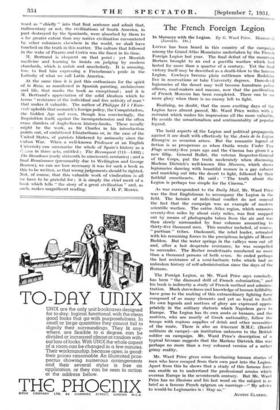The French Foreign Legion
In Morocco with the Legion. By G. Ward Price. Illustrated. (Jarrolds. 18s.) Limn has been heard in this country of the campaign among the Grand Atlas Mountains undertaken by the French Foreign Legion last year. The final defeat of the mountain Berbers brought to an end a guerilla warfare which had lasted for more than a quarter of a century. Yet the final victory itself may be described as a death-blow to the famous Legion. Cowboys become plain cattlemen when Redskins live in reservations or take University degrees. Dare-devil legionaries of the desert may well become humdrum police officers, road-makers and masons, now that the pacification of French Morocco has been completed. There can be no more glory when there is no enemy left to fight.
Realizing, no doubt, that the more exciting days of the Legion have almost passed, Mr. Ward Price writes with a restraint which makes his impressions all the more valuable. He avoids the sensationalism and sentimentality of popular legend.
The lurid aspects of the Legion and political propaganda against it are dealt with effectively by the Amis de la Legion Etrangere as occasion arises. But the romantic legend of fiction is as prosperous as when Ouida wrote Under Two Flags seventy-five years ago and the Cinema has given it a new fillip. General Rollet, the veteran Inspector-General of the Corps, put the truth moderately when discussing Marlene Dietrich's well-known film Morocco, which shows legionaries dancing with beautiful women in a gay cabaret and marching out into the desert to fight, followed by their faithful sweethearts. He said : "The truth about the Legion is perhaps too simple for the Cinema."
As war correspondent to the Daily Mail, Mr. Ward Price was the first Englishman to accompany the Legion in the field. The heroics of individual conflict do not conceal the fact that the campaign was an example of modern scientific warfare. The entire Atlas region, which measures seventy-five miles by about sixty miles, was first mapped out by means of photographs taken from the air and was then slowly surrounded by four columns amounting to thirty-five thousand men. This number included, of course, " partisan " tribes. Ouskounti, the rebel leader, retreated with his remaining forces to the precipitous heights of Mount Baddou. But the water springs in the valleys were cut off and, after a last desperate resistance, he was compelled to surrender. The Berber recalcitrants numbered no more than a thousand persons of both sexes. So ended perhaps the last resistance of a semi-barbaric tribe which had an unbroken history of self-administration since the days of the Romans.
The Foreign Legion, as Mr. Ward Price says concisely, has been "the diamond drill of French colonization," and his book is indirectly a study of French method and adminis- tration. Much shrewdness and knowledge of human fallibility have gone to the making of this extraordinary fighting force composed of so many elements and yet so loyal to itself. Its own legends and mottoes of glory are expressed appro- priately in the military rhetoric which Napoleon gave to Europe. The Legion has its own souks or bazaars, and the soukiers, who are mostly of Greek nationality, follow the troops with copious supplies of drink and other necessities of the route. There is also an itinerant B.M.C. (Bordel militaire de campe)—an institution unknown to the British soldier on campaign. Mr. Ward Price's description of a typical bivouac suggests that the Marlene Dietrich film was perhaps no more than a rosy coloured version of a rather grimy reality.
Mr. Ward Price gives some fascinating human stories of men who have escaped from their own past into the Legion. Apart from this he shows that a study of this famous force can enable us to understand the professional armies which overran Europe in the seventeenth century. But Mr. Ward Price has no illusions and his last word on the subject is as brief as a famous Punch epigram on marriage—" My advice to would-be Legionaries is : Stay so."'
AUSTIN CLARKE.






































 Previous page
Previous page